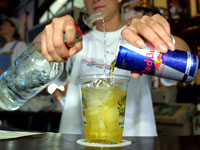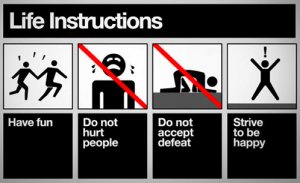
By Amanda Gardner
Now, a new study suggests that combining caffeine and alcohol can pose a risk to young people even when the substances aren’t mixed in the same can or cup. College students who consume nonalcoholic energy drinks such as Red Bull at least once a week are more than twice as likely as their peers to show signs of alcohol dependence, including withdrawal symptoms and an inability to cut back on drinking, according to the study.
“The odds were fairly strong, especially when you look at the dose of energy drink used,” says the lead researcher, Amelia Arria, PhD, director of the Center on Young Adult Health and Development at the University of Maryland School of Public Health, in College Park.
The study, which appears in the journal Alcoholism: Clinical & Experimental Research, was based on interviews with about 1,100 college seniors. The findings do not show cause and effect, and it’s unclear whether energy-drink consumption is directly linked to alcohol problems.
Another possibility is that energy drinks actively contribute to problem drinking. If mixed with alcohol—a common practice among college students—caffeine-laden energy drinks can prolong drinking sessions and mask the feeling of drunkenness, potentially raising the risk for dangerous binges and behavior. (This has been the main concern with caffeinated alcoholic beverages, including Four Loko.)
“Caffeine keeps you awake but just as impaired,” Arria says. “You may feel as if you can get into a car or play a risky game. That’s why this feeling of wide awake drunkenness is more dangerous.”
A similar dynamic can exacerbate alcohol problems over the long term, says Jeffrey Parsons, PhD, a professor of psychology and public health at Hunter College, in New York City. Consuming energy drinks “masks the extent of the drinking in such a way that it can sneak up on people,” he says. “They don’t realize that they’re developing the problematic patterns that are characteristic of alcohol abuse and dependence.”
Nearly two-thirds of the students in the study reported having an energy drink in the past year, and just over half said they consumed the drinks about once a month or less. About 10% of the students consumed the drinks weekly, and roughly 3% did so daily, or almost daily. Red Bull was the most popular drink.
Compared to those who consumed energy drinks rarely or not at all, students who consumed them at least once a week drank alcohol more frequently and in greater amounts, on average. They were also more likely to experience blackouts, skip class or other activities due to hangovers, be involved in a fraternity or sorority, and meet the criteria for alcohol dependence.
The researchers took into account a number of other student characteristics, including sex, race, socioeconomic status, depression symptoms, and total alcohol consumption. Factors such as depression were associated with alcohol problems, as expected, but energy-drink consumption was independently linked to alcohol dependence even after controlling for all risk factors.

No comments:
Post a Comment